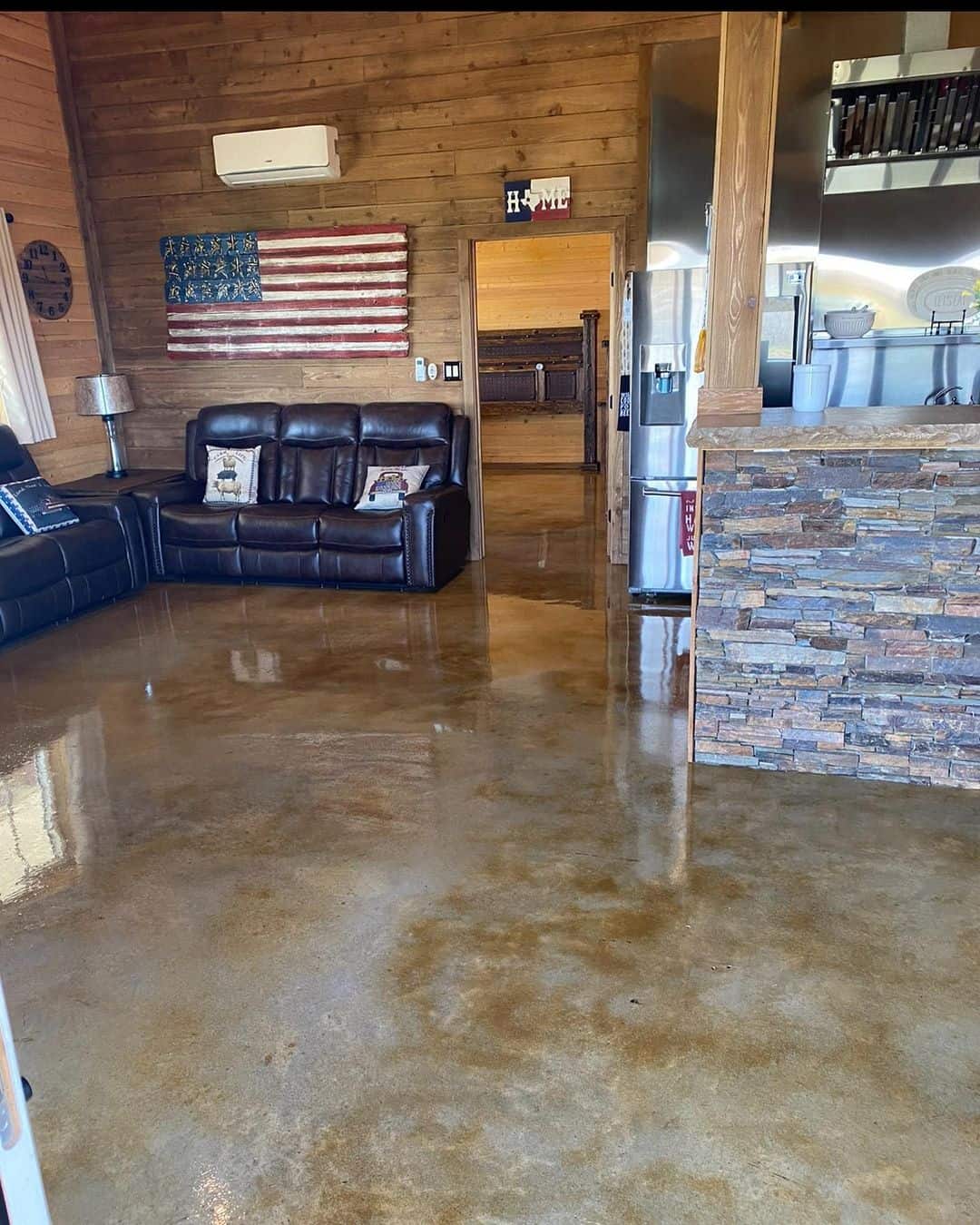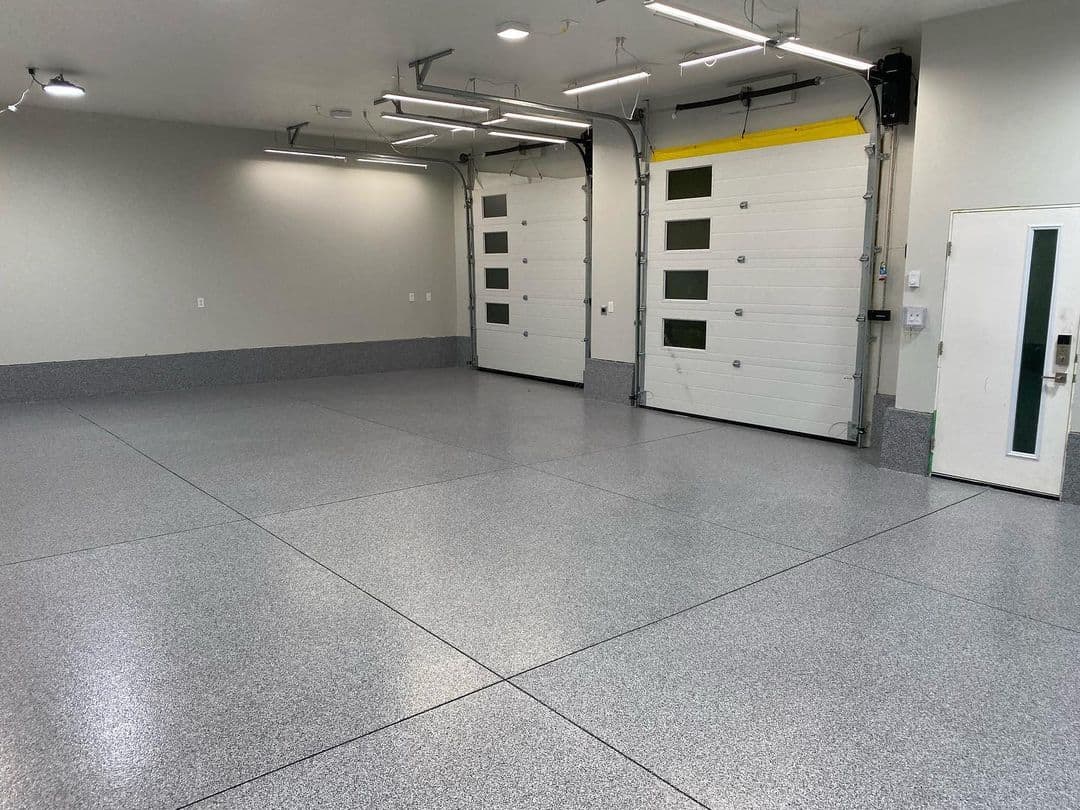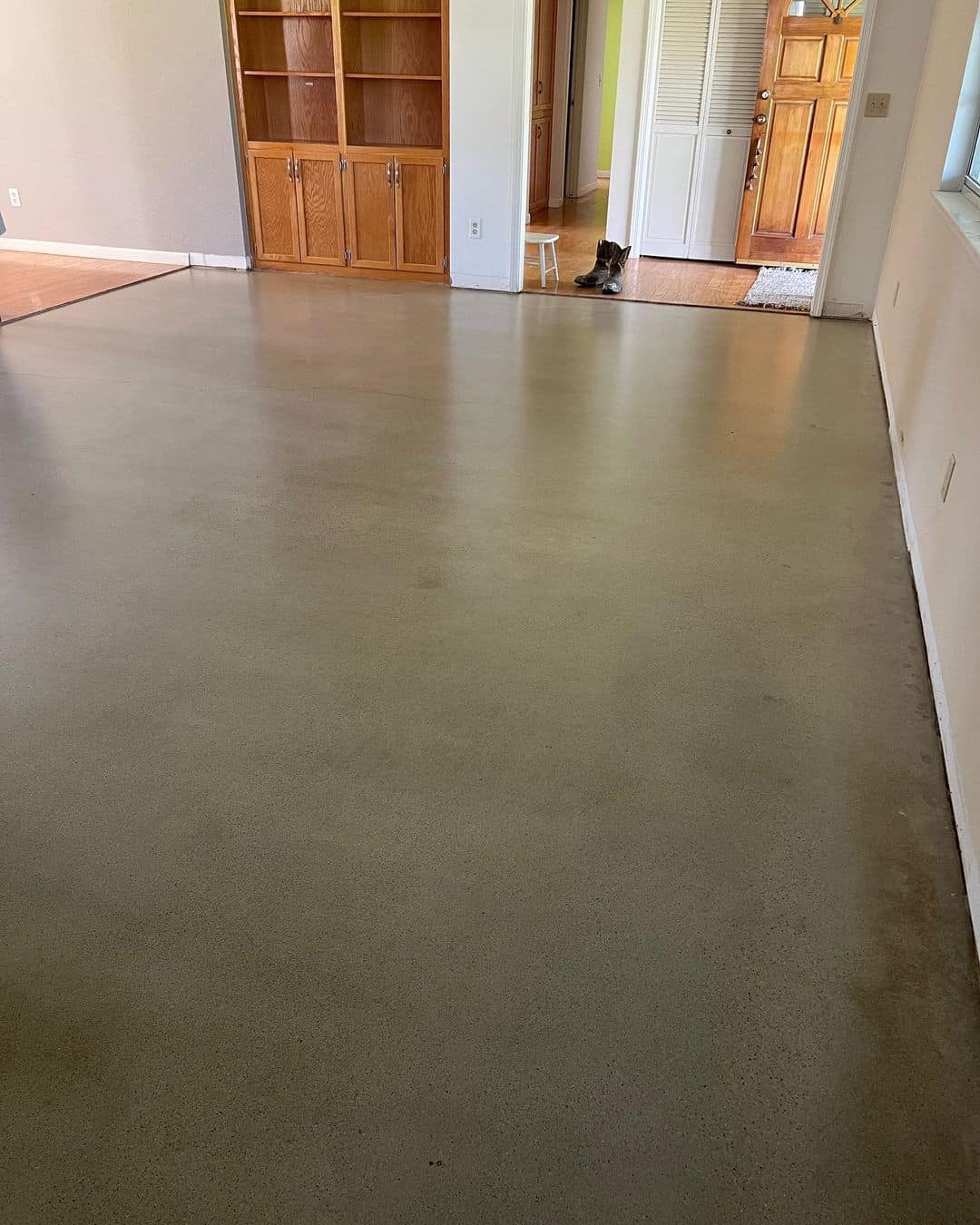Extreme weather can do a lot of damage to your flooring. It will become chipped and cracked over time. This does not only look unpleasant but can also cause injuries.
Imagine what if your little one trips on the garage floor? What if his knee comes in contact with the jagged concrete? Sounds like a nightmare!
Well, if your house flooring has become damaged, it’s time to get it coated. This will add a protective layer over your floor and keep it safe against wear. But, there will be a slight difference in results based on whether you choose concrete stain or epoxy.
So, to help you make the best decision here is a detailed concrete stain VS epoxy comparison. Let’s dive in!
Table of Contents
What is Concrete Stain?

Concrete staining refers to the process of adding colors and organic effects to concrete floors. It’s just like wood staining but for concrete. However, don’t confuse staining with the painting.
The paint stays on top of the concrete, and the layers are as thin as 0.005 inches. Comparatively, stains penetrate deep and react with the calcium hydroxide (hydrated lime) in the concrete surface. As a result, they last longer than paints.
Concrete stains also leave behind a smooth and polished effect. And, if you choose the right stain color, the concrete may also resemble a premium natural stone floor.
Types of Concrete Stains
Generally, all concrete stains are long-lasting. But penetrative concrete stains last longer than film-forming ones.
- Film-forming Stains: These stains only add color to the concrete surface. They don’t have a sealing compound, which means the stain will wear off quickly. You will have to apply a sealer every 3 to 5 years to maintain the look.
- Penetrative Stains: These concrete stain types form a more permanent solution, especially for high-traffic areas. It’s because they don’t only create a protective film on the top. But they also get soaked deep inside the concrete.
What is Epoxy Coating?

An epoxy coating is a mixture of resin and polymers. It’s poured on top of the concrete surface, distributed evenly, and then left to cure.
Since the chemicals react with the concrete, the epoxy coating adheres to the floor. It doesn’t erode or chip after drying. This results in a thick, protective layer that resists mechanical loads easily.
It’s why epoxy-coated floors are mostly found in industrial places like warehouses, shops, and factories. People also use it in the heavily trafficked areas of their homes.
Types of Epoxy Coatings
Not all epoxy coatings produce the same results. Some are thicker and more durable than the rest. It all depends on the type you choose.
- Solid Epoxy Coating: This is 100% pure epoxy with no solvents or other substances. As a result, it is very thick and hard to work with. Most professionals will add accelerators and promoters to speed up the curing process. The resultant coating is highly durable and will withstand intense pressure. It will last up to 20 years with ease.
- Solvent-Based Epoxy Coating: As the name suggests, this type of epoxy coating has a solvent to make the mixture thinner and easier to apply. Usually, xylene (an industrial-grade chemical) and different volatile organic compounds are present in it. So, while this epoxy coating is thin yet durable, it is not suitable for homes. Constant exposure to the chemicals can have a negative impact on your health.
- Water-Based Epoxy Coating: Water-based epoxy coating is a safer alternative to solvent-based options. It uses water to make the epoxy mixture thin and smooth. However, it’s not very durable.
Concrete Stain VS Epoxy: Key Differences

Both concrete stain and epoxy coating are popular choices for homes. So, if you want to make the best decision possible, it’s important to put them in a side-by-side comparison and evaluate their usefulness against your needs.
Here are the key differences between concrete stain and epoxy coating to help you out:
1. Aesthetics
Concrete stains add another tint to the floor. So, if your concrete floors are already painted, you need to match the stain color to it for aesthetic appeal. Otherwise, the colors would mix up to give a funky look.
Even if your concrete is of natural color, make sure to get a similar or complementary stain color. Most people choose gray and neutral shades because they give concrete a resemblance to natural stone. Hence, the overall effect of concrete stain is classic and luxurious.
Comparatively, you can choose any epoxy color or shade. The opaque coating doesn’t reflect the concrete underneath and forms a new layer with a glossy, smooth finish. This gives a modern and contemporary touch to the flooring.
2. Workability
Stains not only stay on top of the concrete but also soak into the surface. Comparatively, epoxy remains at the top. It’s an additional coat on your floor.
As a result, concrete stains are thinner than epoxy. They don’t increase the height of the floor and create problems for fittings or doors in your home. You won’t have to get an adapter or extension for any drain holes in your garage and basement floors, either.
However, since concrete stains create an invisible film on the top, they don’t hide the cracks and damage to the surface below. The flooring needs to be ground, smoothed, and cleaned to ensure the stain is flawless too.
In epoxy, there is no need to treat the concrete floor first. It forms a thick, solid-colored layer on the top that hides everything.
With that said, epoxy isn’t easy to work with. The thickness makes it difficult to apply and spread throughout the floor. You will require professional assistance for it.
On the other hand, concrete stains are sprayed or brushed on the surface. So, you can do it yourself and potentially save a lot of money!
3. Curing Time
The curing time varies depending on the temperature and humidity in the environment. In the case of concrete stains, the coat will dry within 20 minutes of application. But, since several stain coats are applied, the complete process takes 24 hours.
As for epoxy coatings, the floor will dry after 12 to 18 hours of application. You can walk on the surface, though it’s not recommended. Let the floor rest for 36 to 72 hours before returning to heavy traffic.
The curing process will be fully done after 7 days. Some 100% solid epoxies may take longer than that.
4. Safety
Epoxy contains resin, polymers, and several chemical compounds in its mixture. These chemicals make the resultant coating strong. But it may also cause adverse effects on your health.
It is especially true for solvent-based epoxies with volatile organic compounds. Also called VOCs, they are gasses produced during the application of epoxy coating. They also give off a strange smell often called epoxy odor.
Upon release, VOCs quickly react with air to form pollutants. While this makes them less harmful, they can still affect the respiratory system. Your nose and throat can become inflamed.
Long exposure to gas fumes can irritate the lungs and may lead to asthma or sensitization. It’s why professionals use masks, vapor cartridges, and other equipment to make the process safer. Comparatively, concrete stains don’t have any side effects.
5. Durability
Both concrete stains and epoxy coatings add a protective layer to your floor. They will resist erosion, abrasion, and any kind of wear. However, epoxy coatings resist damage better than concrete stains.
It’s because epoxy causes a chemical reaction with concrete and sticks to it like glue. It’s also thick and chemically formulated to withstand pressure. You will see it in commercial space like a warehouse and shop too.
Concrete stains also soak into the pores of the concrete and cause a chemical reaction. But it’s not strong like epoxy. So, although it will last years, there will come a time when the heavy traffic will wear it off.
6. Maintenance
Everything needs maintenance to stay new and last long. Both concrete stain and epoxy coating also require some basic maintenance.
You will have to scrub the floor weekly with high-quality detergent and brush. Do it daily in high-traffic places. Use a damp mop to remove dried marks every month.
However, while you need to be more careful with concrete stains, epoxy allows stress-free cleaning. Unlike stains, it won’t be rubbed off or damaged by too aggressive scrubbing. You can also skip a few cleanup sessions without worrying about the consequences.
7. Price
Epoxy coating is more costly than concrete stains. You will pay around $2 to $5 per square foot for material costs only. Add professional installer charges to the amount, and it becomes more pricey.
Comparatively, concrete staining costs $2 to $4 per square foot. The price can drop as low as 20 and 50 cents if you do the process yourself!
But epoxy-coated floors last way longer than stained floors. They don’t have regular maintenance costs as a film-coated concrete stain would. Plus, when you sell your home in the future, the epoxy coating will add thousands of dollars worth to your property.
So, Which One Should You Choose?
All in all, the right coating for your concrete floor depends on your needs. If you want a natural effect and have a limited budget, concrete stains are the best. But, if you want to customize the floor colors and want a more durable solution, epoxy floor coating is ideal.